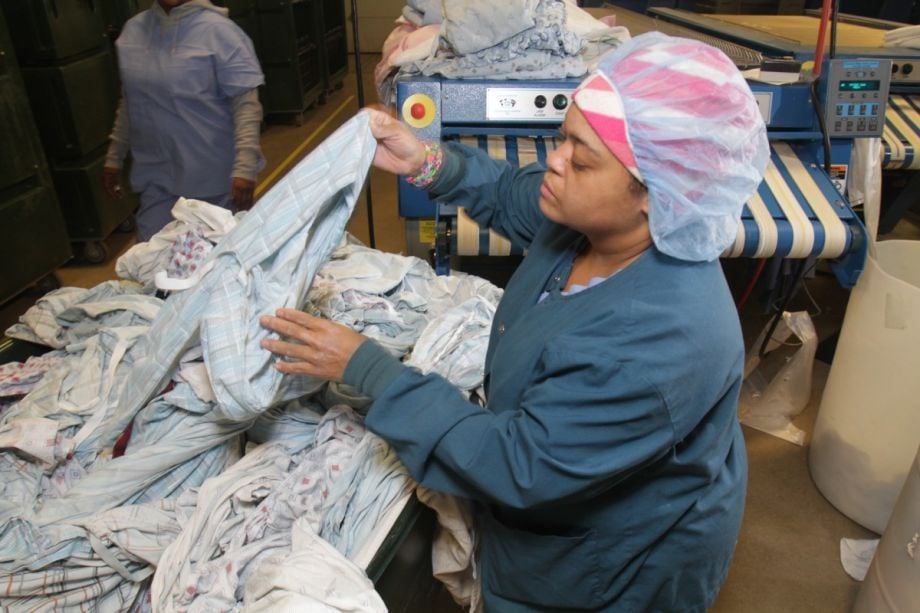Tameka Thomas had returned to society after a five-year prison sentence, and a month after her release, she landed a job with Evergreen Cooperatives in Cleveland with help from a re-entry transition program.
“I thought it was going to be really, really hard to find employment when I came home,” Tameka Thomas says. “I am so thankful for Evergreen for giving me a second chance and for believing in me and just trusting in me and just giving me the opportunity to prove to everyone that even though I made a mistake, that mistake doesn’t define me.”
While Thomas was grateful for the job when she landed it, she didn’t realize that she had found herself in a cooperative business — that is, a business where the workers collectively own the business, make major management decisions and share in the profits.
“You understand the importance of filling these orders that we have, as opposed to coming to work and ‘Why do we have to push out a thousand scrips? Why do we gotta do that?’” Thomas says. “Becoming an owner-operator, you know: if we don’t meet this quota, we don’t get paid. If we don’t fill this order, we lose customers. So, you just tend to have a different outlook.”
She thrived in the environment, and is now a department supervisor. “I started out on the production floor, and I worked my way up,” Thomas says.
Evergreen Cooperatives launched in 2008 to create living-wage jobs in seven low-income Cleveland communities. Instead of trying to lure corporations offering low-wage jobs, the coalition behind Evergreen Cooperatives aimed to catalyze worker-owned businesses with the idea that low-income residents could be trained for the jobs created. Currently, Evergreen employs more than 250 people at three core businesses: an industrial laundry, an urban greenhouse, and an energy-efficiency contractor. The laundry recently took on the Cleveland Clinic as a client, as Next City previously covered.
Now, however, the organization is looking to expand via a different pathway. Today, Evergreen Cooperatives announced the launch of the Fund for Employee Ownership, an investment fund aimed at supporting the conversion of existing businesses to cooperative or Employee Stock Ownership Plan (ESOP) models.
As it did with the original Evergreen network, the nonprofit research and advocacy group Democracy Collaborative is supporting the launch of the Fund for Employee Ownership. The fund will leapfrog the start-up process, explains Jessica Rose, chief financial officer at the Democracy Collaborative. Typically it can take many months, even a year or more, to train employees before they’re prepared to purchase a business from its existing owner. The Fund offers to buy-out owners when they’re ready to sell or retire, and then get to the hard work of converting to employee ownership.
“We’re excited about the opportunity to accelerate that process of developing more employee-owners,” Rose says.
The businesses that undergo conversion will be professionally managed but employee-governed. “One hundred percent worker-owned, one worker, one vote basis,” Rose says. “The workers will be participating in meaningful decisions: what management to hire; how to deal with profit; board governance.”
Joining the Evergreen network will also allow companies to economize by sharing back-office support, Rose explains, and to benefit from a team that “knows what it takes to run a participatory business.”
The change in strategy from starting new businesses to converting existing ones, Rose says, aims to acknowledge the fact that the baby-boomer generation is retiring. “That opportunity is a national story,” Rose says, acknowledging that while the Fund currently is focused on Cleveland and northern Ohio, the vision is to develop a model other communities can implement.
Employee-ownership has other champions among those focused on helping millions of business owners think through what to do as they consider retirement — a phenomenon that could have major consequences for cities.
One of those champions is Andy Manchir, who provides exit planning services for business owners looking to retire. He also trains other exit-planning professionals on ESOPs. Before working on exit-planning, Manchir worked for Fortune 500 companies. Now, his company has an ESOP. “We kind of practice what we preach that way,” he says.
“I like how [employee ownership] gives a good opportunity for business owners while at the same time for rank-and-file employees who work with them and for them. That’s what gets me fired up about this,” Manchir says of ESOPs.
“What that does is it really kind of forces savings in a way our current plan doesn’t do for folks,” he adds. “So many people are going to retire without retirement plan savings. It’s just bad policy for the country.” Manchir says that ESOPs provide a way to address that shortcoming.
Manchir notes that there are tax incentives for ESOPs, and that organizations such as the Exit Planning Institute, which trains exit planners around the country, are making efforts to spread awareness of worker-owner models for retiring business owners.
“There’s a ton of closely-held businesses out there that employ the majority of Americans,” Manchir says. “Those are the owners that really have to be looking out for ‘well, how am I going to transition as I get close to retirement?’”
Indeed, around six million operating companies are privately-owned in the United States, representing around $30 trillion in sales. According to U.S. census data, baby boomers aged 54 to 72 own 63 percent of these companies. Those baby boomer-owned businesses represent roughly $10 trillion in wealth poised for transition, according to the Exit Planning Institute.
Manchir, like Thomas, also sees employee-ownership as an incentive to work hard and perform well. “On average, there’s good academic research that shows the employee-owned business outperforms the traditionally-owned business,” he says. “There’s lower turnover rates in an employee-owned company. They grow a little faster, so therefore these things become more successful businesses.”
Back in Cleveland, Rose is already finding a receptive audience among the area’s business owners.
“We’re focused on industries that employ the kinds of workers we are looking to target,” Rose says, namely low-income people often with barriers to employment such as a criminal record.
The Fund’s first investor has put in roughly $5 million of concessionary debt, Rose says, describing that as “patient capital.”
“There’s a smaller market in the impact space of those types of investors, and we’re hoping that we can partner with more, but our ambition is that this can be at or near market rate [returns],” Rose says.
Around the country, more and more investors are indeed becoming interested in the worker cooperative market as a place where they can earn some financial return while also making a difference.
Although some businesses have already begun discussions with the Fund for Employee Ownership about conversion, Rose explains that succession issues prevent her from disclosing their names.
“It seems to really make a difference to people when you can look them in the eye and say we’re going to take care of the people,” Rose says of those early discussions.
This article is part of The Bottom Line, a series exploring scalable solutions for problems related to affordability, inclusive economic growth and access to capital. Click here to subscribe to our Bottom Line newsletter.

Zoe Sullivan is a multimedia journalist and visual artist with experience on the U.S. Gulf Coast, Argentina, Brazil, and Kenya. Her radio work has appeared on outlets such as BBC, Marketplace, Radio France International, Free Speech Radio News and DW. Her writing has appeared on outlets such as The Guardian, Al Jazeera America and The Crisis.
Follow Zoe .(JavaScript must be enabled to view this email address)


















